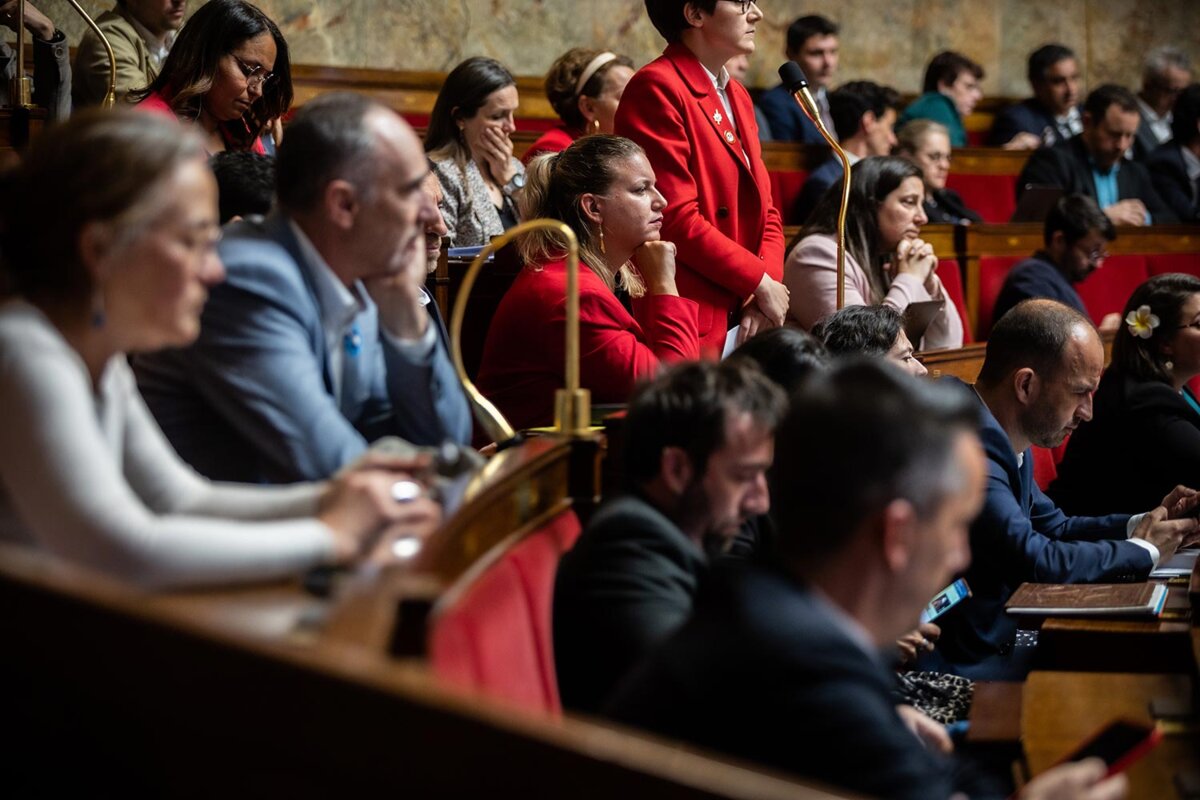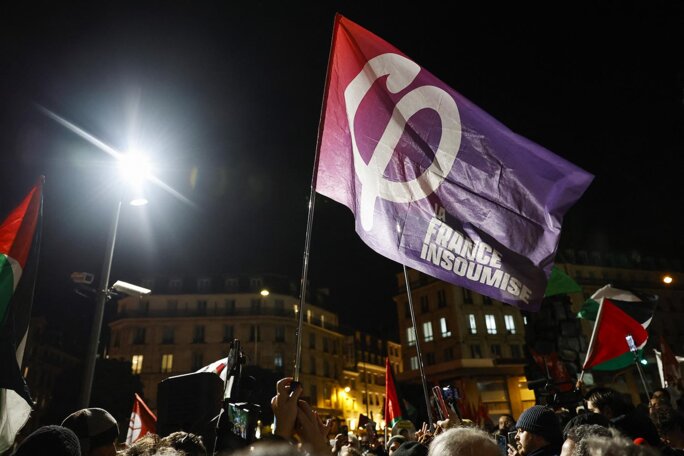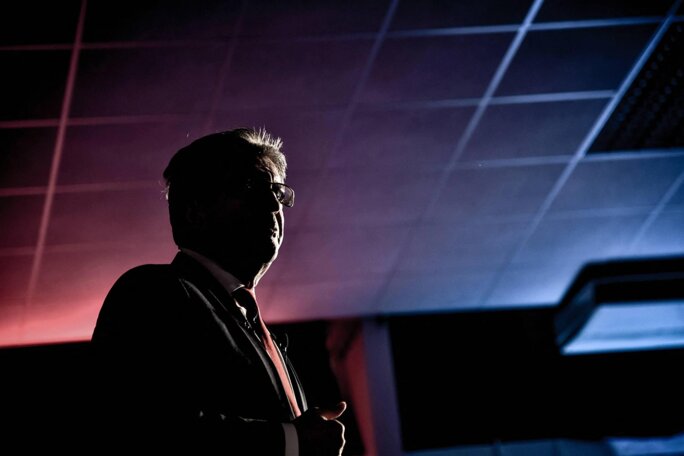Laurent Wauquiez pulled it off. On June 18th, the president of the rightwing Droite Républicaine (DR) group in the National Assembly secured the launch of a parliamentary inquiry into the “links” between Islamist organisations and the radical-left La France Insoumise (LFI) party. “The French have the right to know,” declared the MP, before his fellow party member Vincent Jeanbrun - tipped to act as rapporteur for the investigation - promised to “root out the enemies of the Republic”.
Scheduled for the autumn, this inquiry will hand the Right and the far-right a primetime slot in the media. Their aim is to highlight the need for a political “firewall” around LFI, which Laurent Wauquiez accuses of “playing the Republic's tune” while “attacking its foundations”, and of “threatening our country”, and representing a “disgrace to France”. The new leader of the rightwing Les Républicains (LR), Bruno Retailleau, who is the interior minister, has not held back either, routinely categorising the movement as being “outside the republican fold”.
Though it has outraged the 'Insoumis' and the vast majority of the rest of the parliamentary Left, the DR group’s move only confirms a trend seen since Emmanuel Macron’s re-election in 2022: from the point of view of the far-right, the Right, the centre and even part of the Left, LFI is no longer just another political opponent. “They’re a danger to France,” opines Karl Olive, MP for the Macron-supporting coalition group Ensemble pour la République (EPR), echoing many of his colleagues.

Enlargement : Illustration 1

Without ever having achieved power, the movement founded by veteran politician Jean-Luc Mélenchon is now a brooding presence at the heart of public debate in France. There is no political interview, no off-the-record lunch, no corridor conversation where its name does not come up. One minister, visibly concerned, confides: “To me, they’ve become too dangerous in political life. I can no longer condone that.”
Back in the summer of 2023, when Mediapart asked EPR MP Jean-René Cazeneuve whether he thought it okay that ownership of the Journal du Dimanche newspaper was now in the hands of the far-right – it is owned by the Bolloré group - he replied: “Yes, I know, but Mélenchon is far-left!” Then there are those, such as Les Républicains senator Stéphane Le Rudulier and the mayor of Nice, Christian Estrosi, from the centre-right Horizons, who are calling for the LFI’s “dissolution”. Two ministers, Patrick Mignola and François-Noël Buffet, have gone so far as to suggest that “questions be asked” about stripping the LFI Euro MP Rima Hassan of her French nationality.
The 2022 turning point
“There’s a bit of sincerity, a bit of strategy and a bit of taking the easy option in all of this,” admits one EPR MP, not known for holding back when it comes to her Insoumis colleagues. “Bashing the LFI, Mélenchon or Rima Hassan plays well with our voters, doesn’t take much effort, and it works every time. Unlike with the RN [Rassemblement National], we know our voters barely overlap, there’s almost no crossover between the two blocs. So there’s no real cost,” she points out.
The time when the entire Assembly chamber rose to applaud Jean-Luc Mélenchon’s tribute to gendarme officer Arnaud Beltrame, killed by a terrorist in Trèbes in southern France in the spring of 2018, now feels like a different era. Two years later, news weekly magazine L’Express was writing about the “republican romance” between the Insoumis leader and Édouard Philippe, then Macron's prime minister, who later founded the Horizons party. And who now remembers the 2022 presidential run-off, when Emmanuel Macron borrowed Mélenchon’s words and slogans and let it be known they were texting one another?
In just three years, the mood has shifted drastically. Between most of the political spectrum and the LFI it is no longer a matter of text messages, but of shouting matches on television, social media and across the floor of the Assembly. “Even in the corridors or at the bar, there’s a tension with them you don’t feel with any other group,” notes one MP from the president’s camp.
Many point to the summer of 2022 as the turning point, when the LFI came back from that year's parliamentary elections far stronger than before, leaping from 17 to 75 MPs. The group became more structured and, according to its critics, more hard-faced. “We were struck by their behaviour,” says the same MP. “They didn’t even say hello! That ended up nurturing real personal resentment, which went beyond politics.”
In the section of the Assembly set aside for its vice-presidents, the LFI’s Clémence Guetté and Nadège Abomangoli keep their distance from other members, who are used to “chatting, regardless of political differences,” as one puts it. The conduct of Mathilde Panot, the LFI group leader at the Assembly, also comes under fire. “The meetings of the presidents [editor's note, weekly gatherings of the president of the Assembly, its vice-presidents, the heads of various committees and the presidents of parliamentary political groups] are a lot more tense because of her attitude,” says one attendee. Another MP exclaims: “Even if you pass her in the corridor, she won’t look at you or say hello!”
But these personal issues matter little compared with the deeper, strategic reasons for the LFI’s marginalisation. When the NUPES leftwing alliance - formed in May 2022 - cost Macron’s camp its absolute parliamentary majority at that summer's elections, the calculations across the political centre and at the Elysée were the same: it was vital to “pry the Socialists away” from the LFI to rebuild some kind of workable majority.

Enlargement : Illustration 2

The message clearly struck a chord with MPs of the former ruling majority. The aim was to drive a wedge, and that meant hitting hard. When, in the autumn of 2024, the RN caused a stir by backing a LFI motion of no confidence in the government of Michel Barnier, Macron's camp could barely contain its glee. “The extremes are joining forces!” its MPs shouted across the chamber. Some did raise concerns about lumping together the “far-left” and the RN. “We mustn't end up normalising the far-right,” warned former MP Nadia Hai. But the wheels were already in motion.
The strategy of division, however, has had mixed results, even during the row over the government's controversial pension reform, when the LFI stole the limelight to the frustration of its Socialist allies. In a kind of well-rehearsed dance, the Insoumis camp turned up the heat on the issue; and the Macron camp and the far-right doubled down on accusations of criminal behaviour. When the LFI MP Thomas Portes posed with his foot on a football bearing the face of Olivier Dussopt – the minister who oversaw the pension reform legislation - uproar ensued in the chamber. Veteran MP and former minister Éric Woerth saw it as nothing less than an “incitement to murder”.
A new form of anticommunism?
After the events of October 7th 2023, tempers flared and the accusations of irresponsibility took a new and more virulent form. Though not new, the charge of anti-Semitism against LFI, previously peddled by a small band of figures close to the secular Printemps Républicain movement, grew louder, more widespread, and increasingly normalised. Hamas’s attack on Israel, and the Insoumis’ initial refusal - via some clumsy verbal contortions - to call it “terrorism”, opened the floodgates to a torrent of abuse. Cries of “Hamas! Anti-Semites!” filled the chamber, particularly at the times when the now former Insoumis MP and vice-president of the Assembly Caroline Fiat used to chair the chamber.
On October 10th 2023 Mathieu Lefèvre, EPR president of the France-Israel friendship group, called for Aymeric Caron’s removal as vice-president of the group, citing his “anti-Zionist discourse”. Yet as far as Mediapart is aware, the RN’s two vice-presidents, Sébastien Chenu and Julien Odoul, faced no such demands.
As some Insoumis, with Mélenchon at the forefront, made ever more controversial statements, the 2024 European election campaign, during which the LFI made the Palestinian cause a focal issue, offered fresh ammunition to the radical-left party's critics.
On May 28th, Sébastien Delogu waved a Palestinian flag in the chamber, to cries of outrage from Macron supporters and the RN. He received the harshest penalty available, the same ban as handed to RN’s Grégoire de Fournas after his racist remarks. Yet no such sanction was levelled against LR MP Meyer Habib, who shouted in one session about the “anti-Semite Mélenchon”, and about LFI MPs accused of “backing Islamists”.
The day we no longer have this red rag to wave, it’ll be harder to rally our voters.
Nor was anything done about Habib's successor representing the overseas constituency for French citizens in Israel, Caroline Yadan, well known for hurling the word “collaborators!” at her leftwing colleagues. On January 29th, from the speaker’s microphone, she accused the LFI of harbouring a “hatred of Jews”, to the applause of the RN and the approval of minister Aurore Bergé, who praised her “clarity”. Just recently, after Israel declared war on Iran, she described Mélenchon’s group in the chamber as a “sect of anti-Semites dressed up as a political party, licking the boots of the mullahs”. Again, there was not a word of censure from senior figures in the Macron camp.
These outbursts are reminiscent of the anticommunist rhetoric popular in the last century, especially in the years between the world wars and during the Cold War. “Communism is the enemy!” declared interior minister Albert Sarraut under prime minister Raymond Poincaré in 1927, branding the Left a “universal force for national and social decay”.
Historian Gilles Candar, an expert on the French Left, also sees clear parallels between the eras. “Ever since the Right seized the idea of the nation in the 19th century, it’s been a constant theme for the more leftwing leaders to be suspected of being foreign agents,” he explains. “Clemenceau [editor's note, Georges Clemenceau was prime minister of France in the early 20th century] was accused of working for England, Jaurès [editor's note, Jean Jaurès, the leading socialist politician] for Germany, the communists for the Soviets… There’s sometimes a grain of truth, but it’s always deliberately wildly overstated.”

Enlargement : Illustration 3

By the end of the 20th century, the strength of the anticommunist narrative, which was eventually adopted by parts of the Left itself, had helped to erode the electoral base of the French Communist Party (PCF). And now? The Insoumis, Mélenchon chief among them, have turned the political stigma on its head, transforming “anyone but LFI” into a badge of honour, a rallying cry to fire up their supporters.
The challenge of the presidential election
The political margins where the Insoumis now find themselves confined have become both a trap and a stronghold. “Does it really hurt them that much?” wonders one senior figure from the president’s camp. “Yes, it pushes away some more moderate leftwing voters, but it also shores up support among others, a base that now seems completely stable.”
Others in the centre and on the Right applaud the results of the demonisation campaign launched in 2022: under pressure over their electoral alliance with LFI, the Socialist Party (PS) has ended up drifting away. Their recent party congress produced a - probably short-lived - agreement on the essentials: a desire to break with the deals struck with Mélenchon’s party in 2022 and 2024. In any case, the renewed leftwing feud that grew stronger after October 7th allowed the newly-installed prime minister François Bayrou to clinch a pact last winter with the PS – led by Olivier Faure - that it would not back a motion of no-confidence against him. This has allowed Bayrou to survive six months as prime minister in some kind of stability, albeit a precarious one.
Mission accomplished, then, for the architects of the demonisation of the LFI? The outcome of the recent municipal election at Villeneuve-Saint-Georges reassured the leadership of many rival parties: despite the high-profile candidacy of Louis Boyard, the LFI failed to rally the support of the wider Left in this Paris suburb. Proof, say many, that the strategy of exclusion has trickled down to local level and made LFI local council victories less likely in the future.
That leaves the issue of the presidential elections, now just two years away. From the LFI’s point of view, this constant barrage of attacks could be turned to their advantage, through a form of political judo. After all, isn’t this non-stop attention simply permanent publicity, capable of reaching working-class voters cut off from political life and drawn to radical-Left ideas? In one ministerial office, an adviser suspects the Insoumis are riding the wave of their own demonisation. “It’s their excesses that push them to the margins, but it's that very marginalisation that keeps them in the spotlight,” he says.
Though there is little open debate about it among the political classes, LFI’s treatment has prompted some tactical head-scratching among rivals. “It’s not in our interest for them to drop too low in the polls,” confides a Macron-leaning MP. “The day we no longer have this red rag to wave, it’ll be harder to rally our voters.” A rightwing MP, speaking off the record, says much the same: “Nothing frightens our voters, the professionals and the pensioners in my constituency, more than a second round [editor's note, in the two-round presidential election] between the RN and Jean-Luc Mélenchon. That prospect will obviously help us unite and get a decent vote in the first round.”
-----------------------------------------------------------------------------
- The original French version of this article can be found here.
English version by Michael Streeter


